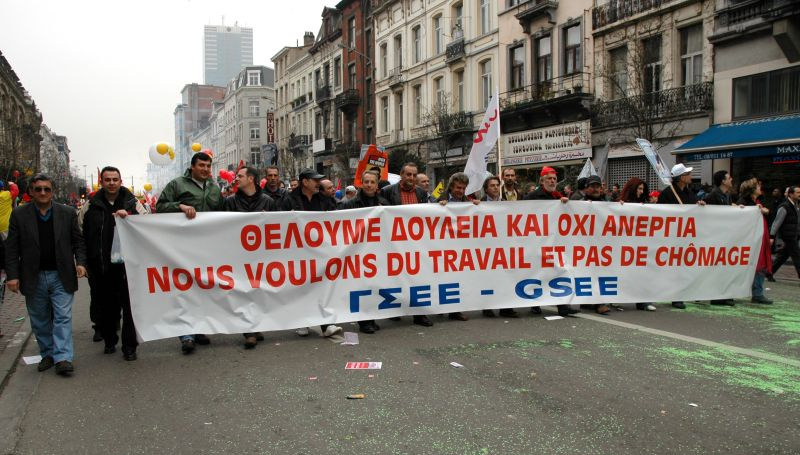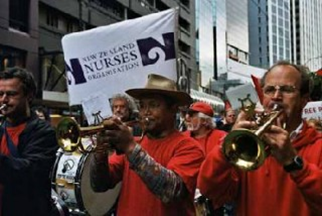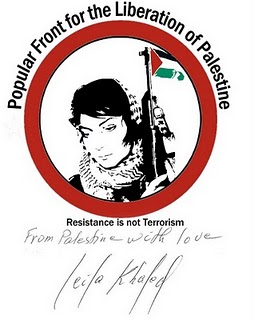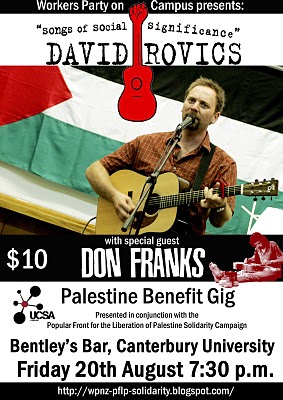The Spark July 2010
Philip Fergusson
Over the past quarter century, workers in New Zealand have been working longer, harder and faster for less pay and in worse conditions. For instance, as Unite union’s national director, Mike Treen, calculated, using official government figures on wages, in the period from the early 1980s to the mid-1990s, real wages – what your wages can actually buy – declined by 25 percent. This decline was the result of the policies of the fourth Labour government and the first term of the fourth National government. Since then, wages have not recovered and remain only three-quarters of their 1982 level. (See: http://www.unite.org.nz/?q=node/704)
The transfer of wealth upwards is also revealed in the fact that corporate profits as a share of GDP rose from 34% in the mid-1980s to 46% in 2005, while wages as a share of GDP fell from 57% at the end of the Muldoon era to 42% in 2005. Continue reading ““The unpalatable truth” : a critique of the Council of Trade Unions Alternative Economic Strategy”
`Marxism 2010' conference report
The Spark July 2010
Jared Phillips, Spark co-ordinating editor
The Workers Party held its annual national Marxism conference at Thistle Hall in Wellington over Queen’s Birthday weekend from June 4-7. It was a weekend of anti-imperialist theory and activity. Approximately seventy members, supporters and other interested people attended throughout the weekend.
Presenting and discussing revolutionary politics
The conference opened on the Friday night with WP national secretary Daphna Whitmore speaking on the revolutionary movement in India. The revolutionary zone spreads from the border with Nepal in the north to the southern states of India. This presentation and discussion was followed by John Edmundson, the WP’s national education officer, speaking on New Zealand’s imperialist role in the occupation of Afghanistan and the quagmire that the invading powers have found themselves in. Continue reading “`Marxism 2010' conference report”
David Rovics gig in Christchuch
Greece Interview: "To have a general strike in Greece it is not such a big deal"
The Spark July 2010
In the last issue of The Spark we reported on recent events from the class struggle in Greece. Some of the fiercest popular resistance to the current crisis of capitalism has erupted in Greece over the last couple of years. The latest chapter in this unfolding drama has been the revelation that Greece is unable to pay back the huge foreign debt that it has accumulated during its years of economic growth since joining the eurozone in 2001. According to a report by Costas Lapavitsas and other economists (http://tiny.cc/a7e05), the debt crisis is an inevitable consequence of the structure of the eurozone, which is extremely hierarchical.
A “core” comprising the richest countries (Belgium, France, Germany and Netherlands) dominates the “periphery” (Greece, Ireland, Italy, Portugal and Spain). Germany has acquired the dominant position in the capitalist “race to the bottom” by squeezing its workers hard in the aftermath of reunification. German politicians and newspapers have been busy whipping up resentment against “profligate” Greeks, since a large chunk of the cost of the bailout package will fall on the German working class. However, it is only the militancy of the Greek workers that have prevented their living standards being pushed down even further than their already low level. It is time for German and other workers to start “learning Greek”!
Mike Kay, industrial officer for the Workers Party, who travelled in Greece in June, spoke to Stavros and Paulin from the OKDE (Organisation of Communist Internationalists of Greece) in Athens. Continue reading “Greece Interview: "To have a general strike in Greece it is not such a big deal"”
Continue reading “Greece Interview: "To have a general strike in Greece it is not such a big deal"”
TEN YEARS MAKING MILITANT NOISE
This year, Wellington group Brass Razoo Solidarity Band clocked up its tenth year of street performances in support of workers’ strikes and anti-war marches.
The Spark talked to BRSB founder Don Franks.
Spark: How did the band start off?

Don: For a long time I’ve contributed little bits of music to support workers’ battles, like making up songs and singing them on picket lines with my banjo. One day I bought this ancient tenor horn for twenty bucks. My idea was to stick it on the wall as an ornament but when I tried blowing I found it still worked. Next day I took it to blarp at an anti-sow crate demo, where they wanted lots of noise. Walking home afterwards, I envisaged lots of horns being played properly at a demo. I recalled that postie John Maynard had played cornet when he was a kid, so I rang him up and said “John, how about we make a union band?” He was keen, and it took off from there. Five of us got together and began rehearsing a rough garage group with a cornet, tenor horn, tuba, snare drum, and a bass drum made out of a rubbish bin. Continue reading “TEN YEARS MAKING MILITANT NOISE”
For a campaign of solidarity with the Palestinian struggle

Philip Ferguson, national organiser, Workers Party
The Israeli invasion of the Gaza Strip at the start of 2009 brought home to many people around the world the brutality of the state of Israel. Hopefully it spurred a lot more people to get involved in supporting the cause of Palestinian liberation. In New Zealand, although there are activists campaigning around issues in Israel/Palestine, the campaigning remains both numerically and politically weak.
There is a strong tendency in New Zealand, for instance, to emphasise justice for Palestinians rather than solidarity with Palestinians. The differences between these few words , which may seem trivial, are actually immense at a political level.
If you are in favour of something for people, it suggests that they cannot fight for it themselves and so you are campaigning for it on their behalf. This essentially portrays the oppressed as passive victims. But the Palestinians are not passive victims – they are an oppressed people and they are fighting every day for their liberation, regardless of what people sitting comfortably in the West are doing or not doing. The notion of doing something for people is essentially condescending.
On the other hand, if you are in solidarity with people, it suggests that these are folks struggling for their rights and you are providing active support for their struggle. You are not replacing their struggle, you are not the struggle, you are carrying out your own struggle as a form of active support of their struggle. Continue reading “For a campaign of solidarity with the Palestinian struggle”
Facebook Shuts Down Palestinian Solidarity Group

The US-based social networking site Facebook has shut down a New Zealand based PFLP Solidarity group, as well as permanently closing the accounts of all four group administrators with no right of appeal. The group, which had approximately 500 members, was established after the recent Flotilla attacks to show solidarity with the Popular Front for the Liberation of Palestine (PFLP), and raise awareness of the solidarity campaign led by the Workers Party of New Zealand, who are fundraising for the PFLP.
None of the administrators of the PFLP Solidarity group were given any
notice from Facebook that they had violated terms or conditions, and were given no direct reason as to why they had had their accounts disabled.
“They did not even send an email to me explaining why my account was disabled”, said one of the group’s administrators.
Marika Pratley, PFLP Solidarity Campaign coordinator and group
administrator in Wellington said, “This was clearly a political attack against the PFLP and an attempt by Facebook to censor and shut down the solidarity campaign”.
The PFLP advocates a single secular state in all of Palestine, with equal
rights for all, regardless of race or religion, and is the second largest
group in the PLO. Facebook have deemed that support for the PFLP violates its terms and conditions while allowing many blatantly racist anti-Palestinian groups to continue to exist without such censorship.
The Workers Party believes that all political ideas and discussion should be free of censorship on the internet, but wishes to expose this hypocrisy, which often surrounds debate of the Palestine issue. Palestinian groups are frequently censored and branded as terrorists while supporters of the racist state of Israel are not.
The PFLP Solidarity Campaign is determined to continue on, despite
Facebook’s censorship. “We have already raised over $1000 through selling T Shirts. Deleting a Facebook group is not going to stop us showing solidarity with Palestine or the PFLP”, said Christchurch administrator Mike Walker.
"End the Siege of Gaza", but then what?
Mike Walker, PFLP Solidarity Campaign co-coordinator
The Spark July 2010
 On the 31st of May commandos from the Israeli Defence Force stormed a boat carrying aid and activists to the besieged Gaza strip, opening fire and killing 9 people on board. In a typical official Israeli response, Deputy Foreign Minister Daniel Ayalon accused the flotilla’s organisers of `having ties to Hamas and al-Qaeda terror organisations’. This has been followed by so-called `universal condemnation’ of the attack by the `International Community’ and calls for an end to the siege. In practical terms this means allowing more goods into the Gaza Strip. What it doesn’t mean is an end to Israeli control of the borders, the airspace, the coastal waters and literally every aspect of Palestinian life. Continue reading “"End the Siege of Gaza", but then what?”
On the 31st of May commandos from the Israeli Defence Force stormed a boat carrying aid and activists to the besieged Gaza strip, opening fire and killing 9 people on board. In a typical official Israeli response, Deputy Foreign Minister Daniel Ayalon accused the flotilla’s organisers of `having ties to Hamas and al-Qaeda terror organisations’. This has been followed by so-called `universal condemnation’ of the attack by the `International Community’ and calls for an end to the siege. In practical terms this means allowing more goods into the Gaza Strip. What it doesn’t mean is an end to Israeli control of the borders, the airspace, the coastal waters and literally every aspect of Palestinian life. Continue reading “"End the Siege of Gaza", but then what?”
Red & Purple: A Marxist Perspective on Queer Liberation
![Queer+Liberation+[Small]](http://fightback.zoob.net/wp-content/uploads/2010/06/queerliberationsmall2.jpg?w=106)
by Ian Anderson, adapted from a talk presented at Marxism 2010.
What does queer liberation mean?
This article aims to deal with this question utilising historical materialism, the mode of enquiry pioneered by Karl Marx and Frederick Engels. Historical materialism explores social relations, such as homosexual oppression, by explaining the productive forces that shape them. With a particular focus on New Zealand history, this analysis aims to sketch the material basis of modern queerness, attempts to control or suppress it, and the politics that have emerged from this contradiction. Continue reading “Red & Purple: A Marxist Perspective on Queer Liberation”
CARD TRICKS
By Don Franks
It was a normal start up on our job the other day, cleaners hurrying in to dump coats and sort out gear for the early morning shift.
Our supervisor cast an eagle eye around the crew.
“Ok, everyone’s all here – anyone need any stuff?”
” Yes, couple of things”
“What?”
“Can we have a minibar and a masseur in our cubby hole?”
Everyone laughed a bit including the boss.
“There’s no bloody credit cards on this job and you’re not MPs with time to fiddle them. Ok, lets get on with it.” Continue reading “CARD TRICKS”

